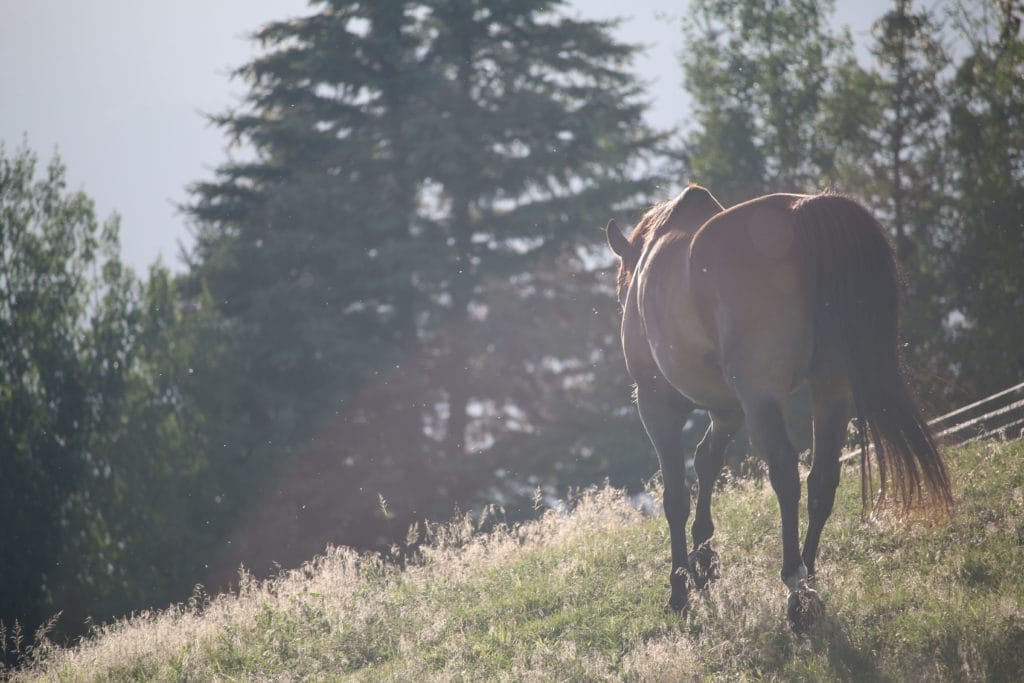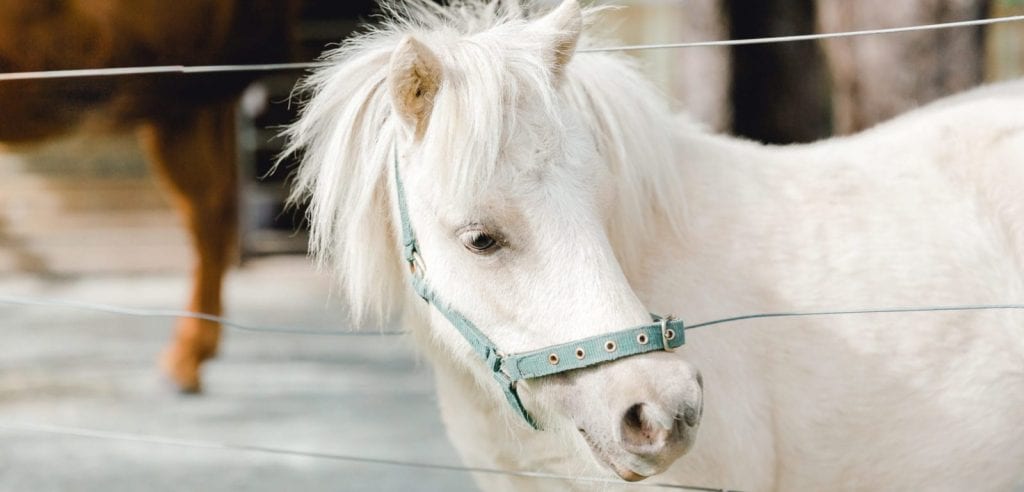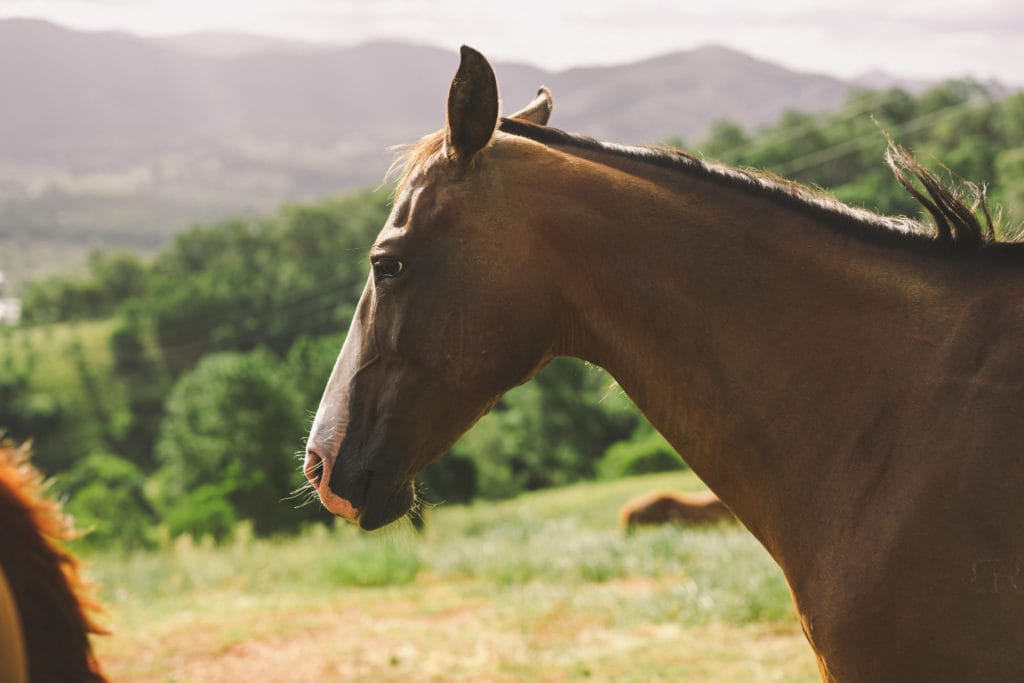“It was profound to see the horses align with my behaviour without any verbal communication. Being in a position of influence, I realised how my behaviour resonates with the people around me, more than just my words.” Overlooking the stunning view from The Banyans’ main balcony, a previous guest of The Banyans describes their experience of Equine Assisted Therapy.
Equine Therapy is one of the most unique therapeutic inclusions offered by The Banyans Health and Wellness Retreat. Dr Anja Kriegeskotten is the lead Psychiatrist and EAGALA Certified Mental Health Professional at The Banyans and has been practising for over twenty years. This includes using equine therapies with a range of clients.
The Banyans follows the EAGALA model of Equine Assisted Therapy. The EAGALA model is the gold standard of equine therapy, as it is a research-based, structured framework for therapy.
To be an EAGALA-certified provider, equine therapists must go through a certification process, ongoing professional development and retrain every two years to maintain the highest standard of scientific practice knowledge and professionalism.
“Horses are herd animals, and they very rarely use vocal communication,” Dr Anja explains. “They have panoramic vision and highly tuned senses that can detect changes as subtle as heart rate. The horses have innate communication and mirroring mechanisms for the survival of their herd. Using these characteristics to reflect the human state is not something we teach the horses, but ourselves.”
When in recovery, some people do not know how to identify, deal with, and process their emotions. “There is often a significant amount of revelation that occurs throughout an equine therapy session,” Dr Anja notices.
However, when a certain pattern keeps coming up with the horses, it usually means that the guest needs to know about it.
Dr Anja explains how Equine Assisted Therapy is not a mode of therapy as such but rather a frame that can be used to apply other psychological approaches.
This further highlights the importance of equine therapies being delivered by a trained mental health professional (such as a psychiatrist) and an equine therapist or specialist. These two professionals “work together collaboratively at all times to ensure clients get the therapeutic attention and support they need” throughout the session.
“The mental health professional is responsible for creating an emotionally safe space in the arena,” Dr Anja describes. “Equine therapists and specialists are able to notice changes in the therapist horse’s behaviour or body language and flag it to me. I must use my discretion to know whether the guest would benefit from knowing those changes. Sometimes, the patient is not ready for what the therapist horse may be reflecting, and it’s important to know when to dig.”
However, when a certain pattern keeps coming up with the horses, it usually means the guest needs to know about it.
Although equine therapies can have valuable benefits across a range of conditions, it’s particularly beneficial for those who may feel like their issues are trapped in their mind.
“Equine therapy is very helpful for people who experience anxiety, PTSD or chronic stress,” says Dr Anja. “The focus lies outside people’s heads, which may not feel like a safe place.”
Horses tend to breathe slower than humans, and matching their breathing naturally can bring a greater calming effect compared to counting strategies.
The early sessions of equine therapy generally focus on building a trust-based relationship with the therapist horse (or horses). Although there is no horsemanship or riding involved with the therapy, initial sessions utilise grooming techniques to help guests become comfortable, make contact and learn about each horse’s personality.
Dr Anja says that “the more open a client is, the deeper the work can go.” Equine therapy is much less threatening than traditional talk therapies, and guests drive the sessions in the direction they naturally need to go.
“Using the horses removes barriers of language, basic mistrust of people or fear of embarrassment. The horses understand the person perfectly and without judgment,” she observes. Our equine-assisted learning and mental health treatments include animal-assisted therapy, gestalt therapy, and therapy sessions with mental health professionals.
In doing so, the sessions are open to diversity, and activities with the horses are developed specifically for each person.
“As the sessions progress, I make my instructions purposefully vague so that guests lead their own discovery. It is very much about empowering the guests and letting them find their own solutions.” Most of the session is spent one-on-one with the horses; as long as the guest seems to be positively engaging with the herd.
“People who get the most out of equine therapies are accepting of the fact that there is no ‘right way’ to do it.” Dr Anja has seen that this can be incredibly difficult for some people who feel they need to control the situation, noting this is often a cause of tension in their life more generally.
Equine therapy often entails building a path around the arena and leading a horse through the course. “The path may be someone’s life or a path to recovery.” The different obstacles will naturally represent different problems in their life, and Dr Anja has seen that people create this connection almost naturally.
“Many people see the therapist horse as the strength or support they need to reach their goals. During the session, the guest is in charge of their life – which may be something they do not feel outside of the arena. We never tell them what to do, but let them explore and enact different potential solutions to their obstacles.”
“As the sessions progress, I make my instructions purposefully vague so that guests lead their own discovery. It is very much about empowering the guests, and letting them find their own solutions.” Most of the session is spent one-on-one with the horses; as long as the guest seems to be positively engaging with the herd.
“People who get the most out of Equine Assisted Therapy are accepting of the fact that there is no ‘right way’ to do it.” Dr Anja has seen that this can be incredibly difficult for some people who feel that they need to control the situation, noting that this is often a cause of tension in their life more generally.
Dr Anja reflects on the fact that while a significant amount of realisation and insight is gained in the arena with the horses, most of the processing and understanding of emotional circumstances occurs outside of the arena. “Being around large animals, there is an element of risk and vulnerability. You are naturally more alert, and everything you learn while in that state is more profound,” suggests Dr Anja.
Moreover, research has shown that revelations and insight take deeper root when individuals understand them in their heads and experience them with their bodies.
“By physically working with the horses, the lessons are better internalised,” says Dr Anja. “There is a gap between saying the potential solutions to your issues and putting them into practice. In equine therapy, we do things with the horses that provide immediate feedback, and this helps close those gaps and creates a deeper level of understanding.”
Dr Anja regularly quotes the Chinese proverb, “What I hear, and I forget, what I see, and I remember, what I do and I understand.”
Equine Assisted Therapy often begins the journey of processing, which can continue with other therapists, such as a psychiatrist, psychologist, or counsellor if necessary.
Alternatively, Dr Anja mentions that although people may not actively dwell on their revelations from the arena during the week, their minds may have released a burden and thus unlocked an ability to begin processing subconsciously.
Equine Assisted Therapy often begins the journey of processing, which can continue with other therapists, such as a psychiatrist, psychologist, or counsellor if necessary.
The Banyans Health and Wellness is a private residence for individuals seeking recovery from substance misuse and dependency, depression and anxiety, eating concerns, chronic stress, trauma and more.
We offer a multidisciplinary program that incorporates Equine Assisted Therapy, psychology and psychiatry, physical therapies (such as personal training and yoga), nutritional therapy and more.
Our comprehensive approach ensures you get the maximum effect and the deepest level of personal insight and understanding.
If you or someone you love would benefit from a stay at our private residence, call us on 1300 226 926, or submit an online enquiry below.



